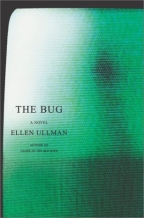The Bug
Ellen Ullman
Doubleday
US Hardcover First
ISBN 0-385-50860-3
Publication Date: May 2003
Pages; Price: 349; $23.95
Date Reviewed: 17-07-03
Reviewed by: Katie Dean © 2003

REFERENCES
COLUMNS
|
|
|
The BugEllen UllmanDoubledayUS Hardcover FirstISBN 0-385-50860-3Publication Date: May 2003Pages; Price: 349; $23.95Date Reviewed: 17-07-03Reviewed by: Katie Dean © 2003 |
|
|
REFERENCES |
COLUMNS |
Reading about the innermost thoughts of an obsessive computer programmer may not seem to be the most appealing prospect, but Ellen Ullman in 'The Bug', has managed to create a compelling novel out of the world of computers. Partly told in first person, this novel traces just over a year in the lives of a computer programmer and tester working for a start up company in California in 1984. Highly realistic, 'The Bug' should certainly provoke some thought the next time you sit at a computer screen and take the programs behind the workings of the machine for granted.
Ullman has used her own extensive experience in the world of computing to create a credible story about life as a programmer. The story is told partially through Roberta Walton's memories of her experiences in her first job with an I.T. company. Through this medium, Ullman is able to draw parallels between programming in the early 1980s when the industry was relatively new, with modern life in which computers play such a central role. Whilst the forging of a link between past and present adds to the relevance of the story to today's reader, it adds little to the story Ullman is really trying to tell. The events that trigger Roberta's memories range from the tenuous - airport customs - to the clichéd - the dot com crash. It becomes a rather heavy-handed means of emphasizing the contrast in fortunes experienced by two characters starting life in the same Californian company.
The remainder of the story is told in third person through the eyes of the other main protagonist, programmer Ethan Levin. In many ways this book is about Ethan, a deeply unattractive character, but one with whom we cannot but sympathize. Ullman has cleverly allowed the reader to see Ethan both from the perspective of his colleagues and from inside his own head. To the outside world he appears as a good programmer, annoying in his efficiency and rather rude and difficult to work with. He is not the type of man to inspire either friendship or sympathy and he does little to help his cause. However, inside Ethan's head is a neurotic mess. Full of insecurities, he begins the novel in blissful ignorance of himself, but events both at work and at home force him to face up to the kind of man he is. The reader goes through this process with Ethan and is drawn into a nightmare world of self-doubt and obsession as he slowly descends into madness. It is this journey into the personality of another human being that makes 'The Bug' such a compelling read. One is left hoping that Ethan Levin could not exist in reality whilst secretly fearing that there is a piece of him in every one of us.
This novel has come in for some criticism on the grounds that it includes far too many lines of programming code. Whilst this is a fair comment and a factor that may discourage some readers, it is also a highly effective means of creating the atmosphere that the novel requires. The two main characters become completely absorbed in the world of programming, to the detriment of both their personal lives. 'The Bug' is a novel about obsession, in this case, the human desire to build something original and lasting.
Finally to the bug that gives this novel its name. This bug, the Jester as it becomes known, is the lynchpin of the story. Its creation is attributed to Ethan and his failure to eliminate it symbolizes his growing hysteria at his belief in his own inadequacy. Conversely it is the means through which Roberta is led to her real life's vocation. It also seems responsible for creating a series of events that see major changes taking place within the start up company employing Ethan and Roberta. In this sense, Ethan does appear to have created an independent force of evil that he should be able to control, but instead seems to be controlling him. This has led one critic to refer to 'The Bug' as a modern version of Frankenstein. However, anyone reading this novel in the expectation of reading a twenty-first-century Mary Shelley is likely to be disappointed, but such a comparison is perhaps unfair to Ellen Ullman who has created a novel worth reading in its own right.